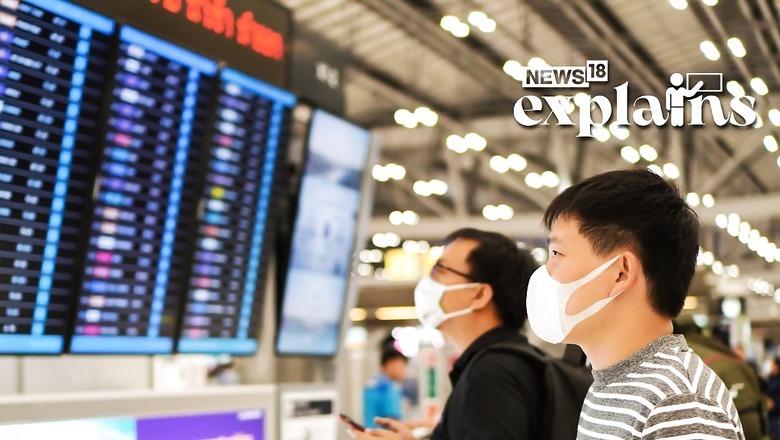
views
The United States has issued a travel advisory urging Americans to reconsider their plans to travel to China due to concerns over arbitrary law enforcement, exit bans, and the risk of wrongful detentions.
While no specific cases were mentioned, the advisory follows the recent sentencing of a 78-year-old US citizen to life imprisonment on spying charges in May.
The advisory also highlighted that Chinese authorities possess significant discretion in labeling various documents, data, statistics, or materials as state secrets, which could lead to the detention and prosecution of foreign nationals for alleged espionage.
The advisory listed a wide range of potential offenses that could lead to legal trouble, including participating in demonstrations, sending critical electronic messages regarding Chinese policies, or even conducting research in areas considered sensitive by the Chinese government, according to a report by Associated Press.
China’s ‘Countermeasures’
The advisory was issued in response to several recent developments in China.
Firstly, the passage of a comprehensive Foreign Relations Law, which has provisions to impose countermeasures against individuals or entities deemed detrimental to China’s interests.
Additionally, China recently enacted a broadly worded counterespionage law, causing concerns among the foreign business community. There have been instances of office raids, and China has also implemented a law to impose sanctions on foreign critics. These developments have contributed to a sense of fear and caution among people and businesses operating in or considering travel to China.
What Does the Advisory Say?
“The People’s Republic of China (PRC) government arbitrarily enforces local laws, including issuing exit bans on U.S. citizens and citizens of other countries, without fair and transparent process under the law,” the U.S. advisory said.
“U.S. citizens traveling or residing in the PRC may be detained without access to U.S. consular services or information about their alleged crime,” it warned. Exit bans could be used to compel individuals to participate in Chinese government investigations, pressure family members to return from abroad, resolve civil disputes in favor of Chinese citizens and “gain bargaining leverage over foreign governments,” the advisory said.
The United States has also issued similar advisories in the past for its citizens in the semi-autonomous regions of Hong Kong and Macao. While previous advisories may have focused on issues related to lockdowns and border closures during China’s strict “zero-COVID” policy, the current advisories appear to address broader considerations beyond the pandemic.
China’s ‘Hostage Politics’
China has a history of responding strongly to what it perceives as attempts by the United States to criticize its authoritarian Communist Party-led system. In the past, China has issued its own travel advisories regarding the United States, cautioning its citizens about issues such as crime, anti-Asian discrimination, and the high cost of emergency medical assistance.
As of now, there has been no immediate response from China regarding the travel advisory issued by the United States on Monday. Due to China’s political system and the Communist Party’s control over legal matters, specific details regarding the accusations against John Shing-Wan Leung, the accused spy, are not readily available, according to AP. Leung, who also holds permanent residency in Hong Kong, was detained in Suzhou on April 15, 2021, a period when China had implemented border closures and strict restrictions on domestic movement to combat the spread of COVID-19.
In addition to several detained Americans, there have been cases of Chinese-Australians also being held without clear information on their sentencing. Cheng Lei, a former employee of China’s state broadcaster, and writer Yang Jun have been detained since 2020 and 2019, respectively.
One of the most widely known cases of arbitrary detention involves two Canadians, Michael Kovrig and Michael Spavor. They were detained in China in 2018, shortly after Canada arrested Meng Wanzhou, the chief financial officer of Huawei Technologies and daughter of the company’s founder, on a US extradition request. Kovrig and Spavor were charged with national security crimes without detailed explanations. They were released three years later following the resolution of fraud charges against Meng by the United States. China’s actions in this case have been widely criticized by many countries, who have referred to it as “hostage politics.”
Deteriorating US-China Ties
As per AP, the current travel warnings come at a time when US-China relations are strained across various issues such as trade, technology, Taiwan, and human rights. Despite the tensions, both sides have taken steps to improve the situation.
US Secretary of State Antony Blinken recently visited Beijing, and Treasury Secretary Janet Yellen is scheduled to make a highly anticipated trip to Beijing as well. Additionally, a new Chinese ambassador to Washington has been appointed and presented his credentials to President Joe Biden.
However, there have been incidents that highlight the underlying tension in the relationship, the report says. China formally protested after US President Joe Biden referred to Chinese leader Xi Jinping as a “dictator” shortly after Blinken’s visit.
President Biden shrugged off the protest, stating that his words would not negatively impact US-China relations and expressing his intention to meet with Xi Jinping in the near future. The Biden administration has also faced criticism from Beijing for explicitly stating that the US would defend Taiwan if China were to attack it, as China claims Taiwan as its own territory.
Biden has also made it clear that he does not plan to change his blunt stance on China, as he believes it is necessary. The administration is also facing pressure from both Democrats and Republicans to take a tough stance on China, making it one of the few issues where there is bipartisan agreement.
Associated Press contributed to this report


















Comments
0 comment